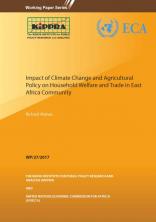WP27 Impact on Household Welfare

Anthropogenic climate change will, over the coming decades, cause dramatic transformations in the biophysical systems that will afect human settlements, ecosystem services, water resources and food production, all of which are closely linked to human livelihoods (UNFCCC, 2005; IPCC, 2001; 2007; O’Brien and Leichenko, 2007; Mearns and Norton, 2010). These transformations are likely to have widespread implications for individuals, communities, regions and nations. In particular, poor, natural resource-dependent rural households will bear a disproportionate burden of the adverse impacts (Adger, 2001, 2003; Burton et al., 2006). The extent to which these impacts will be felt depends in large part on the extent of local and national adaptations and adaptive capacities (Shah et al., 2008; Yesuf et al., 2008; Mearns and Norton, 2010).
Although there is a considerable scientiic uncertainty about the future trajectory of climate change, its impacts are already discernible and will increasingly afect the basic elements of life for people around the world (IPCC, 2007). Such impacts include those on numerous agricultural regimes, and human health including infectious disease vectors (Adger et al., 2007). While climate change is a global phenomenon, potential efects are not expected to be uniform; rather they are unevenly distributed both between and within countries (Hunter et al., 1998; O’Brien and Leichenko, 2009). Moreover, the diferential impacts on the livelihoods of human population vary and are largely determined by the location of settlement and levels of income, education and awareness (Hunter et al., 1998). Africa is expected to experience adverse impacts from climate change mainly due to the interactions of multiple stressors, including extreme poverty, over-dependence on rain-fed agriculture, HIV/AIDS prevalence, insuicient public spending on rural infrastructure, poor data availability and quality, and knowledge gaps (UNEP, 2005; IPCC, 2007). These stressors contribute to a weak overall adaptive capacity and thus may compound poverty for vulnerable groups.